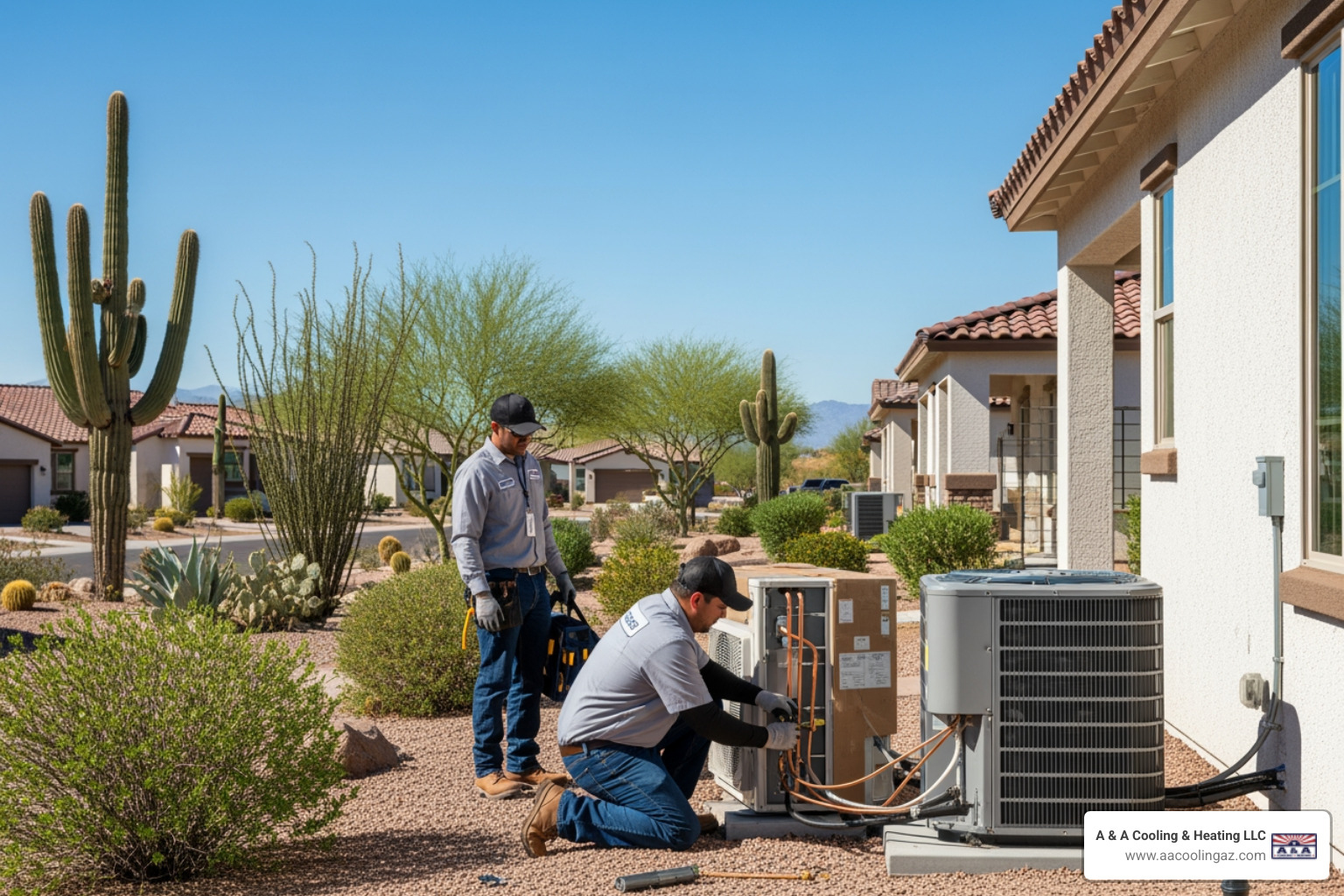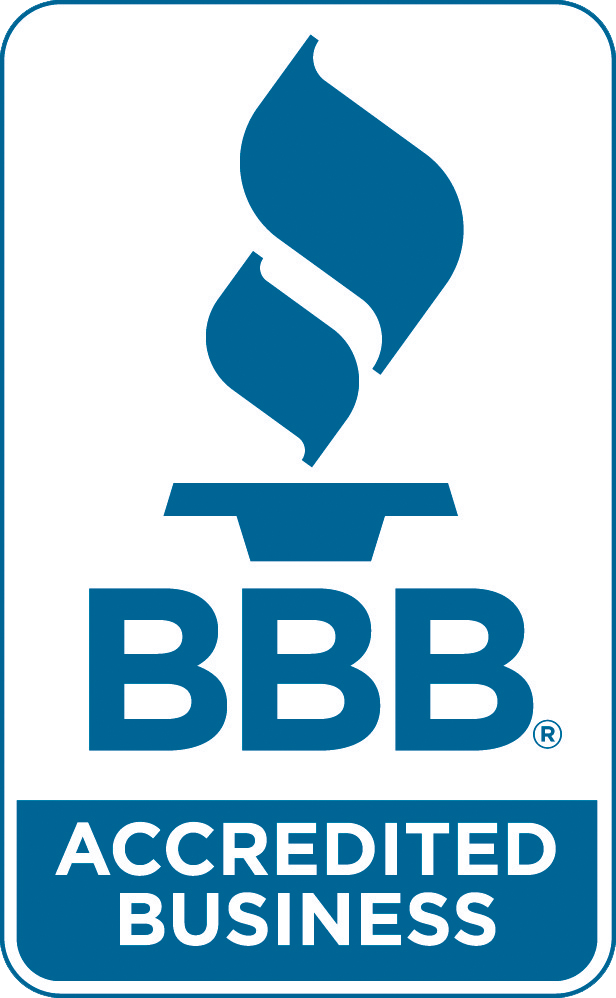AC Blows Hot Air: What to Do When Your System Fails
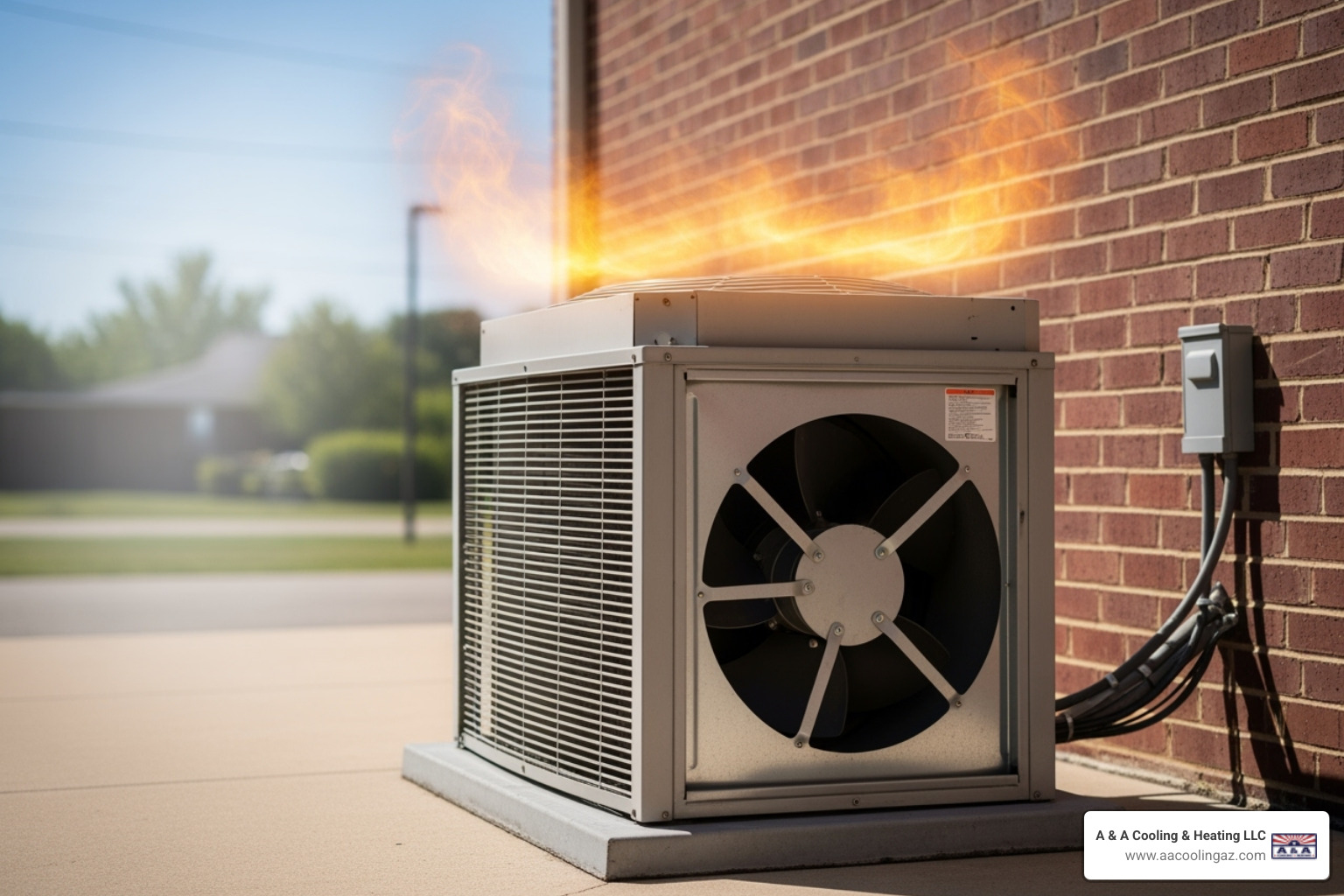
When Your AC Starts Blowing Hot Air in an Arizona Emergency
When your AC starts blowing hot air during Arizona's brutal summer, you need answers fast. Here's what to check immediately:
Quick 5-Step Emergency Checklist:
- Check thermostat - Set to COOL, not HEAT
- Replace air filter - Clogged filters cause overheating
- Reset circuit breaker - Look for tripped switches
- Clear vents - Remove furniture blocking airflow
- Turn off system - Prevent further damage while troubleshooting
It's 115°F in Apache Junction, and instead of cool relief, you're hit with a blast of hot air from your vents. An AC failure in this heat is a serious problem, but don't panic.
Many issues that cause an AC to blow hot air have simple solutions. From incorrect thermostat settings to dirty filters, several common problems can be fixed without a service call.
This guide will walk you through the most likely causes and what to check first. Some fixes take minutes, while others require professional help. Either way, you'll know what's wrong and how to get your cool air flowing again.
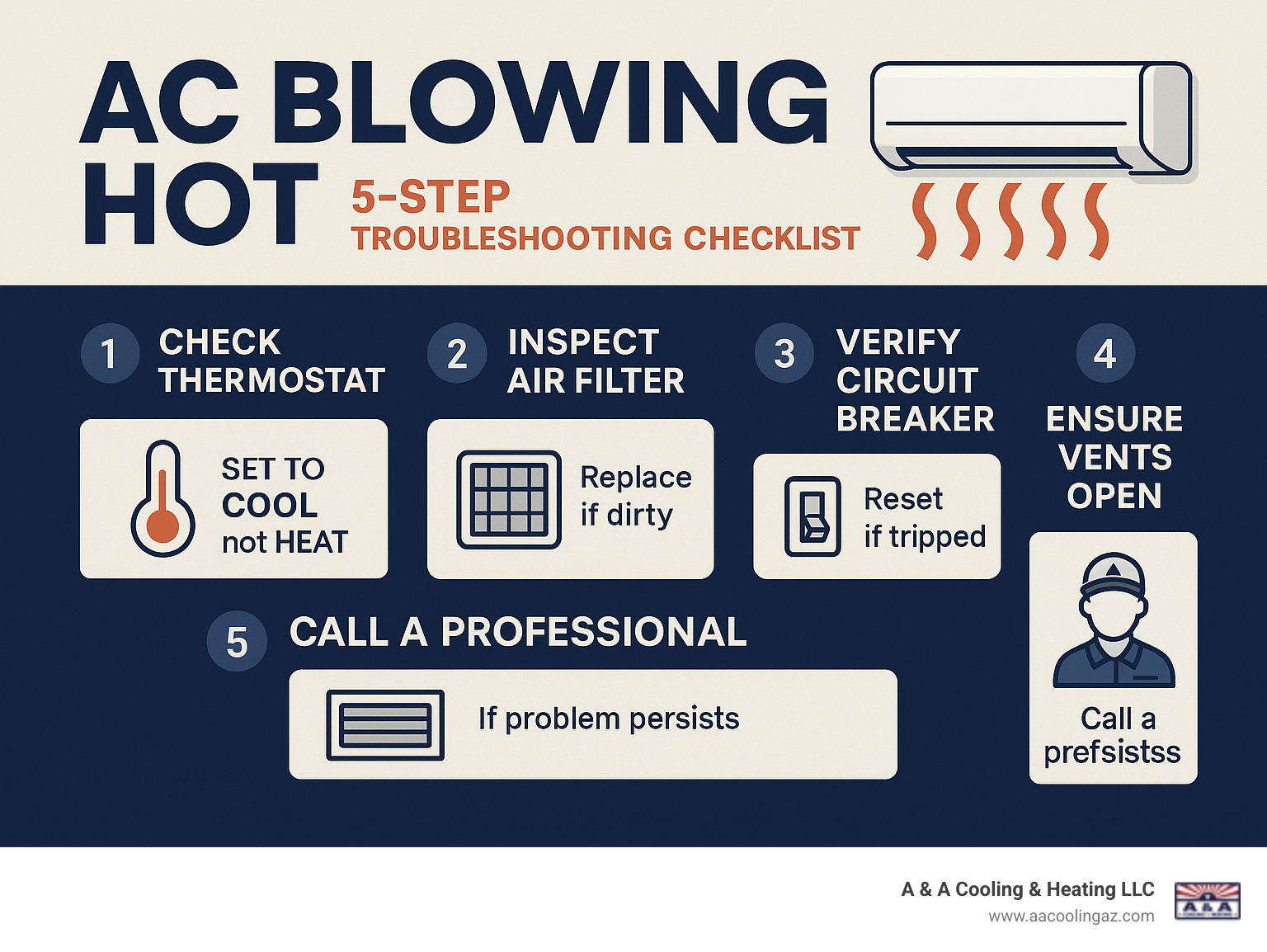
Start Here: Simple DIY Troubleshooting Steps
Before calling for help, walk through these simple checks. As HVAC professionals since 1976, we know a quick fix often saves the day—and a service call! These basic steps solve the problem more often than you'd think.
Check Your Thermostat Settings
Your thermostat is often the culprit when your AC blows hot air. We've seen many service calls resolved by a simple settings adjustment.
- Mode Setting: Ensure your thermostat is set to 'COOL', not 'HEAT' or 'FAN ONLY'. It's an easy mistake to make, but if it's on 'HEAT', the system is just doing what it's told.
- Fan Setting: Set the fan to 'AUTO', not 'ON'. When set to 'ON', the fan runs continuously, circulating warm air between cooling cycles. This can make it feel like the AC is blowing hot air.
- Batteries: If your thermostat has batteries, check if they're low or dead. Weak batteries can prevent the system from receiving the correct signals.
- Schedule: For programmable thermostats, verify the schedule. A power outage can reset it to default heating settings.
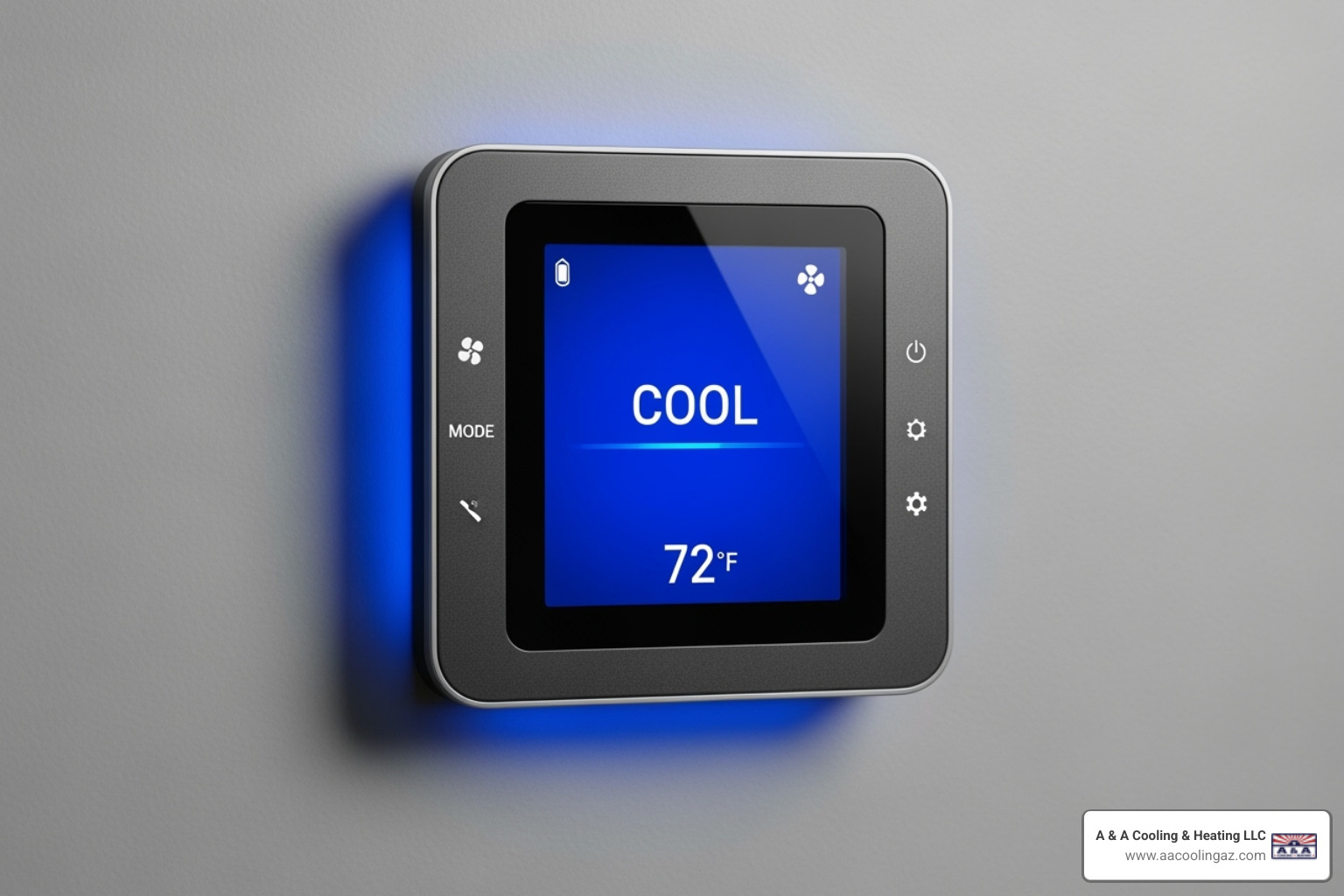
Inspect and Change the Air Filter
A dirty air filter is a top reason for an AC to blow hot air. This forgotten component significantly impacts your system's performance.
A clogged filter restricts airflow, forcing your system to work harder and overheat. This lack of airflow over the evaporator coil can cause it to freeze solid, even in extreme heat. A frozen coil cannot cool your home's air, resulting in warm air from your vents and potential water damage when the ice melts.
How often should you change it? In Arizona, check your filter monthly during peak cooling season. Most homes need a new filter every 1-3 months, but homes with pets or dusty conditions may need monthly changes. This simple, inexpensive task can prevent costly repairs.
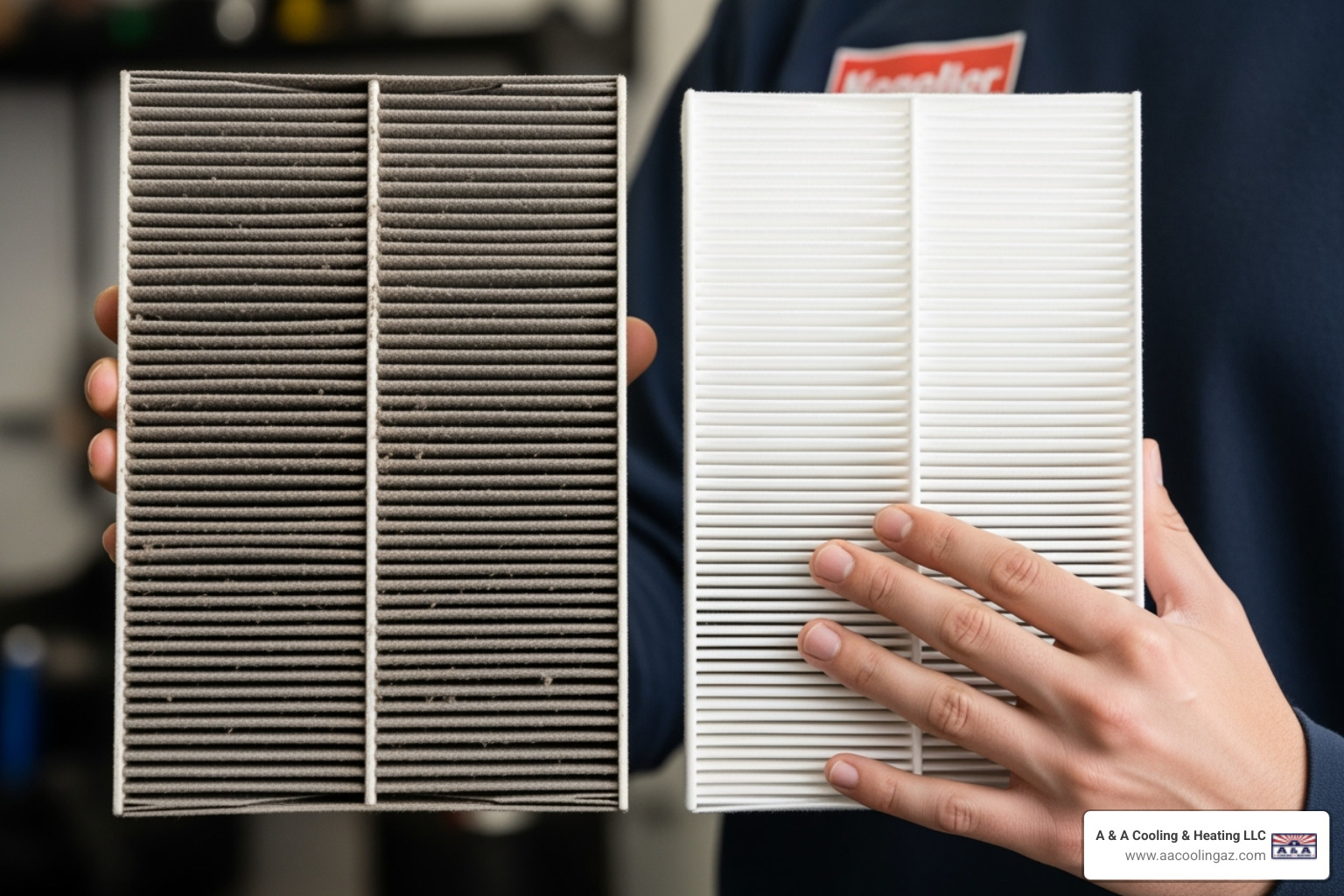
Check Circuit Breakers and Power Switches
Your AC system uses a lot of power, and sometimes a breaker will trip to protect the system.
- Main Electrical Panel: Look for a tripped breaker. It will be in the middle or "off" position. Flip it completely off, then back on.
- Indoor Unit Power Switch: Check for a power switch near your indoor unit (air handler). It often looks like a light switch and can be flipped off by accident.
- Outdoor Unit Disconnect Box: The outdoor unit has a disconnect box on the wall nearby. Ensure the switch inside is in the "on" position.
If a breaker trips again immediately after resetting, you have a more serious electrical problem. In this case, call a professional. Do not attempt to fix complex electrical issues yourself.
Ensure Vents and Registers Are Open
Blocked vents can disrupt your AC's airflow, much like a clog in a pipe. Walk through your home and ensure all supply and return vents are open and unobstructed.
Furniture, curtains, or boxes can easily block vents, starving your system of the air it needs to work efficiently. While it's tempting to close vents in unused rooms, closing too many can create pressure imbalances that strain your system. Proper airflow is essential for effective cooling, and blocking it can lead to your AC blowing warm air.
Why Your AC is Blowing Hot Air: Common Culprits
If the simple DIY fixes don't work, the problem is likely more complex. These issues involve the core components of your cooling system. Understanding them will help you communicate with an HVAC technician.
Low Refrigerant and Leaks
Refrigerant is the chemical that cools your home's air. It circulates in a closed loop and should never run low unless there's a leak. Low refrigerant means your system can't absorb heat effectively, resulting in warm air from the vents.
Signs of a leak include:
- Hissing or gurgling sounds from your unit.
- Oily residue on refrigerant lines or coils.
- A frozen evaporator coil. Low refrigerant can cause the coil to get too cold and freeze, preventing it from cooling the air.
Refrigerant leaks are not a DIY fix. They require professional tools to locate and repair. Ignoring a leak can destroy your compressor, a very expensive component. If you suspect a leak, turn off your AC and call a technician. Understanding how an AC system works highlights why refrigerant is so vital.
Dirty or Frozen Coils (Evaporator & Condenser)
Your AC has two coils: the indoor evaporator coil and the outdoor condenser coil. If either gets too dirty or freezes, your system will blow warm air.
- Evaporator Coil (Indoor): This coil absorbs heat from your home's air. Dirt buildup (often from a clogged filter) insulates the coil, preventing it from absorbing heat. Poor airflow can also cause it to freeze solid. A frozen coil can't cool the air and can cause water damage when it melts.
- Condenser Coil (Outdoor): This coil releases heat outside. Arizona's dust and debris can coat this coil, trapping heat. This forces your system to overheat and struggle to cool your home.
If you see ice on your indoor coil, turn off the AC and let it thaw completely. While you can gently rinse the outdoor coil with a hose (with the power off), the indoor coil requires professional cleaning.
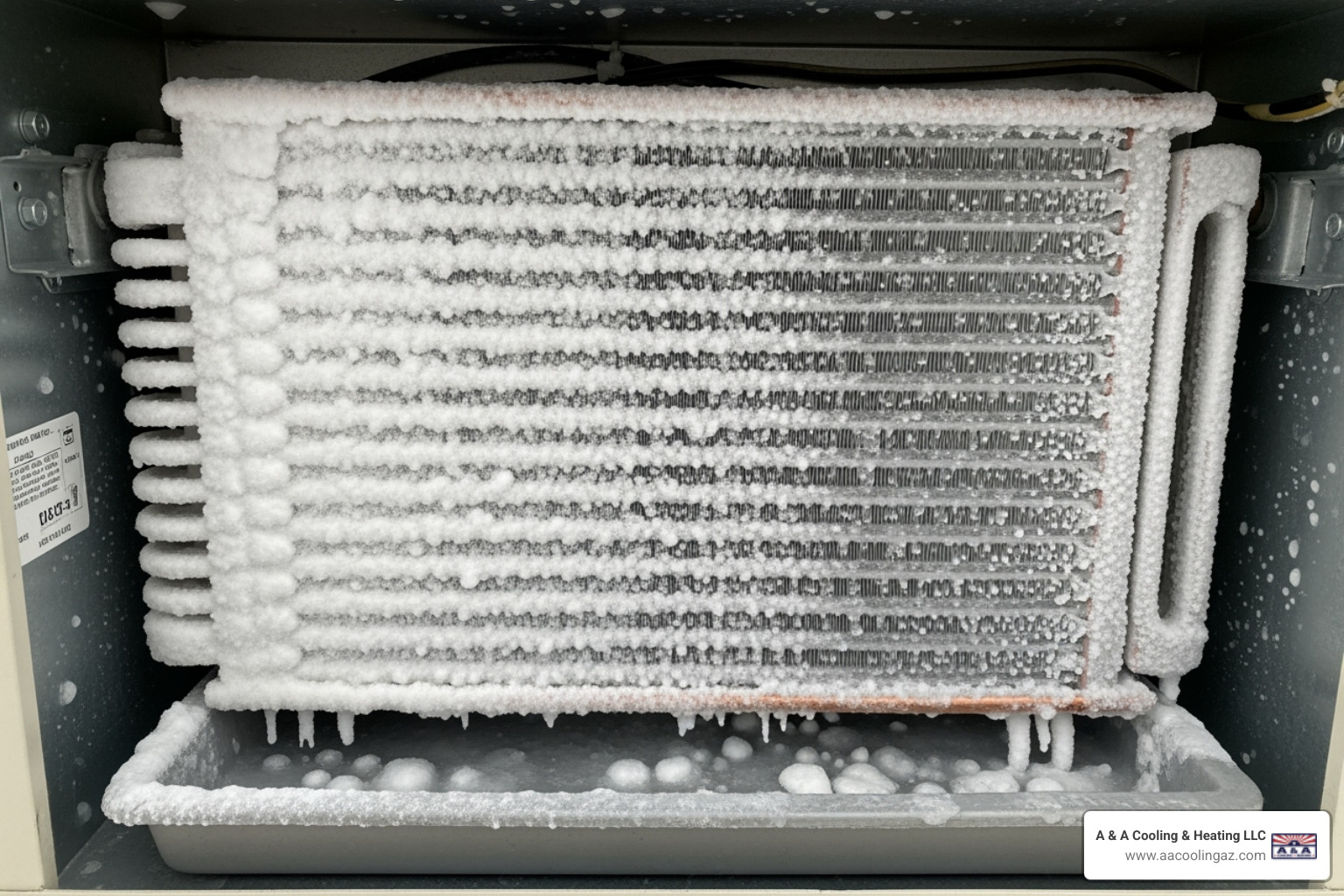
Outdoor Unit Malfunctions
Your outdoor unit contains critical components for releasing heat. If any of these fail, your AC will blow warm air.
- Condenser Fan: The large fan on top of the unit pulls air over the condenser coil to release heat. If the fan motor fails, the system will overheat and stop cooling.
- Compressor: The compressor is the heart of the AC, pumping refrigerant through the system. A failed compressor means no cooling. Signs of failure include grinding or rattling noises.
- Debris Blockage: Dust, leaves, and overgrown plants can block airflow around the outdoor unit, causing it to overheat. Keep at least two feet of clear space around the unit.
If the outdoor unit isn't running or the fan isn't spinning, turn the system off and call for a diagnosis to prevent further damage.
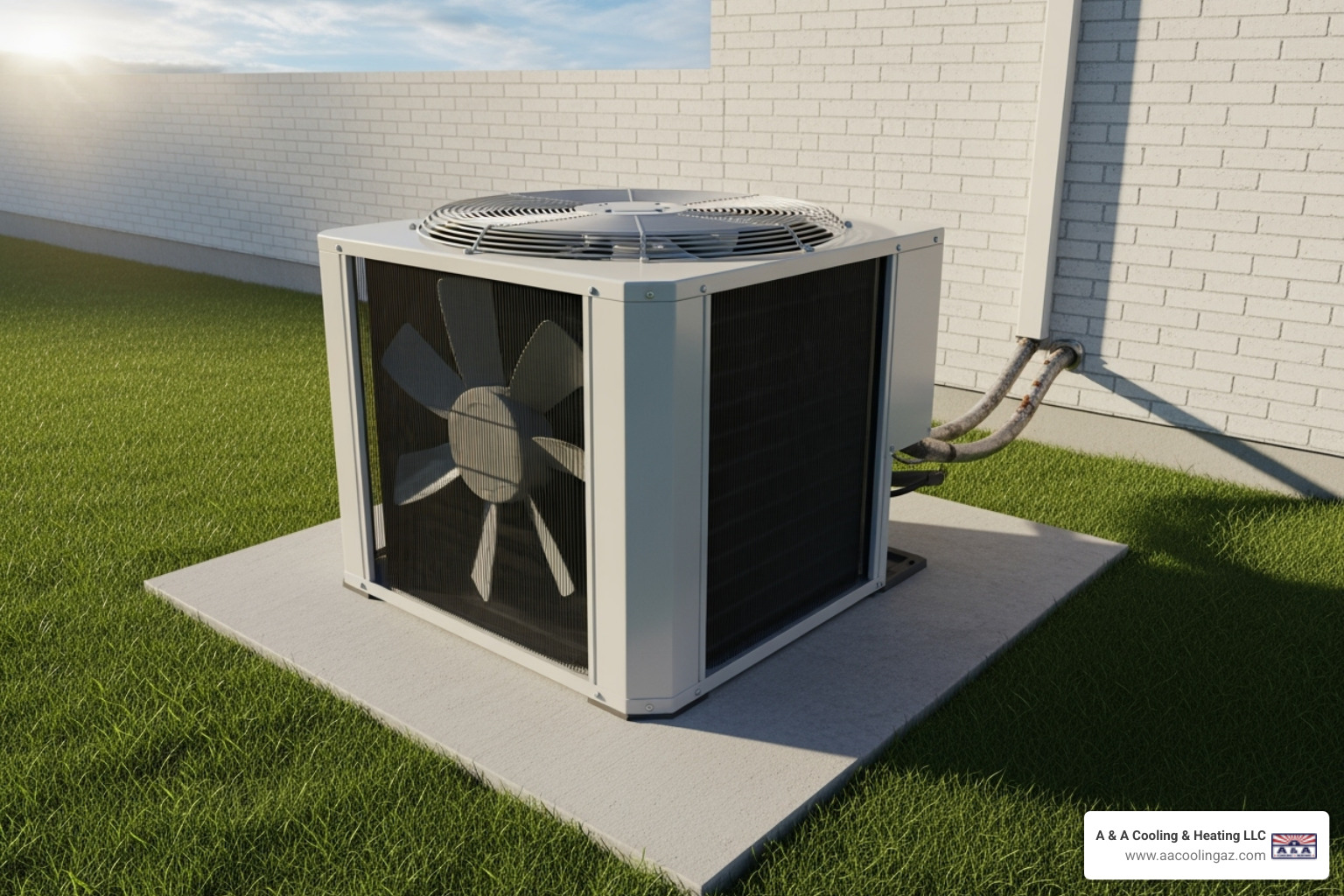
Electrical Issues
Air conditioners rely on many electrical components. When one fails, it can cause the system to blow hot air.
- Faulty Capacitors: Capacitors provide the electrical jolt to start the compressor and fan motors. A failed capacitor (often visibly bulging) will prevent these parts from starting.
- Worn Contactor: The contactor is a switch that controls power to the outdoor unit. If it wears out, the outdoor unit won't receive power.
- Damaged Wiring: Arizona's heat and sun can damage wiring over time, interrupting power to crucial components.
- Short Cycling: This is when the AC turns on and off rapidly without completing a cooling cycle. It can be caused by faulty sensors or control boards.
Electrical problems require a professional diagnosis. If you've checked the breaker and the unit still won't run, call for service.
The Best Defense: How Regular Maintenance Prevents Problems
Arizona summers are brutal on AC systems, but most breakdowns are preventable. With our experience in Apache Junction since 1976, we know regular maintenance is the best defense against system failure.
Your AC needs regular attention, just like your car. An annual tune-up is crucial for a system working overtime in our desert climate.
The Importance of Annual Tune-Ups
Scheduling maintenance on a working AC might seem unnecessary, but an annual tune-up is a smart investment in your comfort. During a professional inspection, our technicians find and fix small issues before they become major problems.
We check electrical connections, inspect motors for wear, clean hard-to-reach components, and lubricate moving parts. We also verify refrigerant levels to catch small leaks early, preventing major compressor damage. These proactive steps ensure your system runs efficiently, lowering energy bills and preventing surprise breakdowns. The benefits of home cooling maintenance are significant.
Keeping Coils and Components Clean
Professional maintenance includes a deep cleaning that goes beyond DIY methods.
- Condenser & Evaporator Coils: We use specialized tools and solutions to thoroughly clean both indoor and outdoor coils, removing stubborn buildup that restricts heat transfer.
- Drain Line: We clear the condensate drain line to prevent clogs, which can shut down your system and cause water damage.
Clean components ensure optimal airflow and efficiency, reducing strain on your system and preventing failures.
Long-Term System Health
Regular maintenance is about ensuring the long-term health of your AC. Our Cool Club maintenance plan is designed to keep systems running reliably in Arizona's climate.
Benefits include:
- Fewer Breakdowns: We catch small issues before they become major failures.
- Improved Efficiency: A clean, well-adjusted system uses less energy, lowering your utility bills.
- Longer Lifespan: Proper maintenance extends the life of your equipment, giving you peace of mind and reliable performance.
Consistent maintenance keeps your AC ready for Arizona's heat, making prevention the best medicine for your comfort.
Frequently Asked Questions about ACs Blowing Hot Air
When your AC blows hot air during an Arizona summer, questions arise quickly. Having served Apache Junction since 1976, we've answered them all. Here are the most common ones.
Should I turn my AC off if it's blowing warm air?
Yes, turn the system off immediately. Continuing to run a malfunctioning AC can cause severe damage to critical components like the compressor, leading to more expensive repairs. Turning it off prevents further damage and allows frozen coils, a potential cause of the problem, to thaw. It also saves you from paying for electricity that isn't cooling your home.
Can a dirty filter really cause the AC to blow hot air?
Yes, absolutely. A clogged filter is a very common cause of an AC blowing warm air. It restricts airflow to the evaporator coil, which can cause the coil to freeze solid. A frozen coil cannot absorb heat from your home's air, so the system circulates warm air instead. The restricted airflow also puts immense strain on the entire system, leading to inefficiency and potential damage.
What's that hissing sound coming from my AC?
A hissing sound almost always indicates a refrigerant leak. Your AC is a closed system, so low refrigerant means there is a leak. The hissing is the sound of high-pressure refrigerant gas escaping.
If you hear this sound, turn your system off immediately and call a professional. Do not attempt to fix it yourself. Running an AC with a refrigerant leak can destroy the compressor, leading to a very costly repair. A technician needs to find and fix the leak, then recharge the system to the correct level.
When to Call a Professional
While DIY troubleshooting is great, some AC problems require professional expertise for safety and effectiveness. If you've tried the basic checks and your AC is still blowing hot air, it's time to call a pro.
Reach for the phone immediately if you notice these warning signs:
- Refrigerant Leaks: Hissing sounds or oily residue require specialized equipment to fix safely.
- Electrical Issues: Problems with capacitors, wiring, or contactors are dangerous for DIY repair.
- Compressor Problems: Grinding, banging, or a compressor that won't start needs an expert diagnosis.
- Persistent Frozen Coils: If coils refreeze after thawing, it indicates a deeper issue.
- Strange Noises or Smells: Burning smells or loud mechanical noises signal serious problems that should not be ignored.
We've been keeping Apache Junction homes comfortable since 1976. Our experienced technicians diagnose the root cause to provide a lasting solution, not just a temporary fix.
Don't suffer through the heat. We're here to get your cool air flowing again quickly and reliably. Your comfort is our priority, and sometimes that means letting a professional handle it. And should you need heating services later, you can schedule your furnace repair service today.








